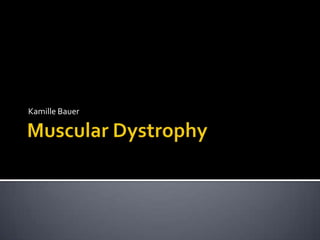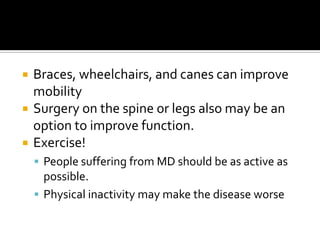Muscular dystrophy presentation
- 2. What is it?Muscular Dystrophy (MD) is a group of inherited diseases in which the voluntary muscles progressively weaken overtime.Heart and other organs can also be affected.MD affects more than 50,000 Americans.9 major types:Duchenne, Myotonic, Becker, Limb-girdle, Facioscapulohumeral, Congenital, Oculopharyngeal, Distal, and Emery-Dreifuss
- 3. Can occur at any ageMost common in young males.Type is based on what age the individual is when muscular dystrophy appearsAlso depends on how severe the disease is, which muscles it affects, rate of progression, and the way it appears.Some types of muscular dystrophy only affect males.Some individuals with this disease experience mild symptoms, while others suffer from severe muscle weakness, dying at an early age.
- 4. CausesDefects in certain genesThe type of MD is determined by which gene is defectiveIn 1986, researchers discovered the gene that, when defective causes Duchenne MD.In 1987, the muscle protein associated with this gene was given the name dystrophinWhen the gene fails to produce dystrophin, Duchenne MD occursDuchenne muscular dystrophy is the most common and fatal childhood type.
- 5. Duchenne Muscular Dystrophy1 in 3500 male birthsBegins with proximal muscle weakness around age 4 Progresses to distal muscles, making walking more difficultAround age 10, most children are in wheelchairsSome experience cognitive problems
- 6. Most types of MD are a form of inherited disease called X-linked disorders or genetic diseases that mothers can pass on to their child, even though the mothers are not affected by the disease.Some forms of MD are not inherited but occur because of a gene abnormality or mutation.
- 7. SymptomsAll forms: muscle weakness Myotonic: muscle spasms or stiffening after use, hand weakness, foot drop Duchenne and Becker: clumsiness, frequent falling, difficulty getting up, waddling gait, curvature of the spine. Drooling, eyelid drooping
- 8. ComplicationsCardiomyopathyDecreased self-independence and mobilityLung failureMuscle tightness around jointsMental impairment
- 9. MD DiagnosisMuscle biopsyDNA testingBlood enzyme testsElectromyography or nerve conduction testsElectrodes are used to test the muscle and/or nerves
- 10. TreatmentNo cureMedications and therapy can relieve symptoms and slow progression of the diseaseHowever, scientists are researching ways to insert a working dystrophin gene into muscles of boys with Duchenne and Becker MDAlso, researchers are exploring potential muscle-building drugs to help reverse progressionDietary supplements, creatine, and glutamine are other potential treatments being studiedhttp://www.youtube.com/watch?v=JnDVRB1DIUA
- 11. Braces, wheelchairs, and canes can improve mobilitySurgery on the spine or legs also may be an option to improve function.Exercise!People suffering from MD should be as active as possible. Physical inactivity may make the disease worse
- 12. Benefits of ExercisePrimary focus is on gaining muscular strength and enduranceAerobic exercise is important in preventing excess body fat, as well as decreasing cardiovascular risk factors Stretching increases ROM and prevents contracturesFor children, exercise activities should be as game-like as possible
- 13. MedicationsCorticosteroids can slow muscle damage in patients with Duchenne muscular dystrophy.Phenytoin, procainamide, or quinine may treat delayed muscle relaxation for those with Myotonic MD.Medications can also be prescribed to treat heart problems in some forms of muscular dystrophy.Many studies are being conducted to find additional treatment methods
- 15. ReferencesDurstine, J. Larry., and Geoffrey E. Moore. ŌĆ£Muscular Dystrophy." ACSM's Exercise Management for Persons with Chronic Diseases and Disabilities. 2nd ed. Champaign, IL: Human Kinetics, 2003. 254-258. "Muscular Dystrophy - PubMed Health." Web. 22 Mar. 2011. <http://www.ncbi.nlm.nih.gov/pubmedhealth/PMH0002172/>."Muscular Dystrophy - Duchenne Muscular Dystrophy - Becker Muscular Dystrophy - Limb-girdle Muscular Dystrophy ┬╗ Types of Muscular Dystrophy." Health, Fitness, Glamour Online Magazine. Web. 22 Mar. 2011. <http://www.magazine.ayurvediccure.com/types-of-muscular-dystrophy/>.www.webmd.com














